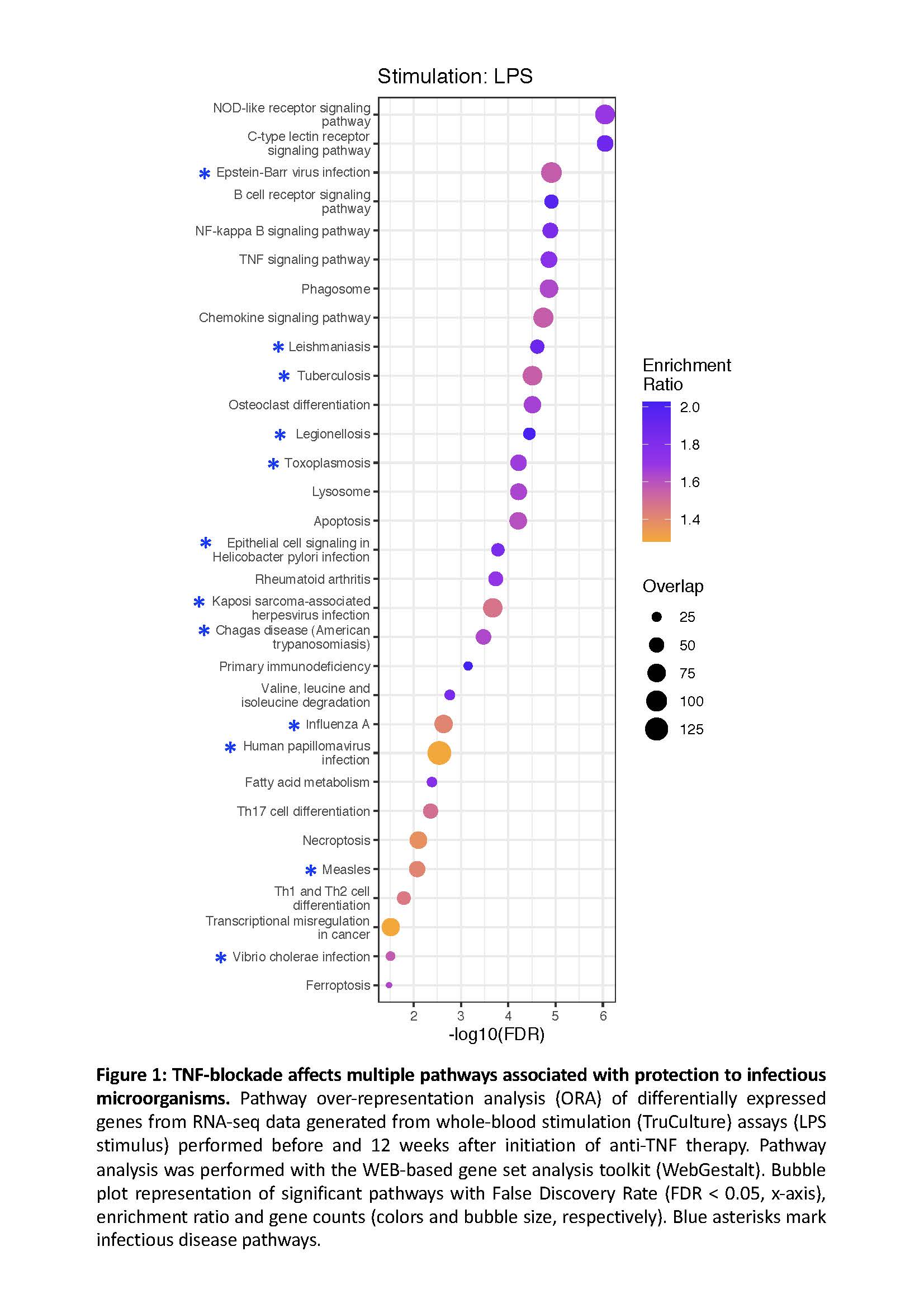Back
Abstract Session
Spondyloarthritis (SpA) including psoriatic arthritis (PsA)
Session: Abstracts: Spondyloarthritis Including PsA – Treatment I: Axial Spondyloarthritis (0542–0547)
0547: Profiling of Systemic Immune Responses in Axial Spondyloarthritis Patients Reveals Strikingly Distinct Cellular and Molecular Mechanisms of Action of IL-17A Inhibitors and TNF-Blockers
Saturday, November 12, 2022
5:45 PM – 5:55 PM Eastern Time
Location: Room 204
- LR
Lars Rogge, PhD
Institut Pasteur
Paris, France
Presenting Author(s)
Nicolas Rosine1, Surya Koturan1, Vincent Guillemot2, Claire Leloup1, Fanni Veress1, Tharshana Stephen1, Hanan Yahia-Cherbal1, Jérémie SELLAM3, Francis Berenbaum4, Natalia Pietrosemoli1, Elisabetta Bianchi1, Corinne MIceli5 and Lars Rogge1, 1Institut Pasteur, Paris, France, 2Institut Pasteur, Paris, Ile-de-France, France, 3Sorbonne Universite, AP-HP, Saint-Antoine hospital, Paris, France, 4Sorbonne University - Saint-Antoine hospital, Paris, France, 5APHP, Paris, France
Background/Purpose: IL-17A inhibitors (IL-17i) and TNF-inhibitors (TNFi) are currently the only biologic drugs available to treat axial spondyloarthritis (axSpA). While several studies have provided mechanistic insights into TNFi action, much less is known how IL-17i affect immune responses in patients. We have compared the effects of IL-17i and TNFi on immune cell frequencies and induced immune responses to obtain information about the mechanisms of action of these two drugs in axSpA patients in vivo.
Methods: Induced immune responses to microbial and pathway-specific stimuli were analyzed in peripheral blood samples from 40 axSpA patients before and after IL-17i or TNFi treatment, using highly standardized whole-blood stimulation assays. Changes in gene expression were determined by RNA sequencing and secreted molecules were measured using proximity ligation assays.
Results: IL-17A-blockade had very limited effects on systemic immune responses with no significant gene expression changes detectable in stimulated whole-blood cultures when comparing samples before and 16 weeks after treatment initiation. In contrast, anti-TNF therapy induced profound changes in patients' immune responses affecting the expression of more than 4000 genes. Pathways analysis revealed major effects of TNFi on the expression of genes involved in protection from bacterial (Tuberculosis, Legionellosis), viral (EBV, Influenza) and parasitic (Leishmaniasis, Toxoplasmosis) infections (Fig. 1). Analysis of secreted inflammatory cytokines and chemokines showed that TNF-blockade also strongly affected innate and adaptive immune cell signaling, while only minor changes were observed in stimulation cultures from IL-17i-treated axSpA patients. Furthermore, we noted major effects of TNFi, but not of IL-17i, on neutrophil and monocyte counts in the circulation of treated patients.
Conclusion: We show that the two currently used biotherapies of axSpA act by strikingly distinct cellular and molecular mechanisms. While anti-TNF therapy has major effects on systemic immune responses with potential implications for increased susceptibility to infectious microorganisms, IL-17 inhibitors had a lesser impact on systemic immune responses compared to TNFi, suggesting that may rather act on non-immune cells and/or in inflamed tissues.
 TNF-blockade affects multiple pathways associated with protection to infectious microorganisms
TNF-blockade affects multiple pathways associated with protection to infectious microorganisms
Disclosures: N. Rosine, None; S. Koturan, None; V. Guillemot, None; C. Leloup, None; F. Veress, None; T. Stephen, None; H. Yahia-Cherbal, None; J. SELLAM, None; F. Berenbaum, 4Moving Biotech; N. Pietrosemoli, None; E. Bianchi, None; C. MIceli, None; L. Rogge, None.
Background/Purpose: IL-17A inhibitors (IL-17i) and TNF-inhibitors (TNFi) are currently the only biologic drugs available to treat axial spondyloarthritis (axSpA). While several studies have provided mechanistic insights into TNFi action, much less is known how IL-17i affect immune responses in patients. We have compared the effects of IL-17i and TNFi on immune cell frequencies and induced immune responses to obtain information about the mechanisms of action of these two drugs in axSpA patients in vivo.
Methods: Induced immune responses to microbial and pathway-specific stimuli were analyzed in peripheral blood samples from 40 axSpA patients before and after IL-17i or TNFi treatment, using highly standardized whole-blood stimulation assays. Changes in gene expression were determined by RNA sequencing and secreted molecules were measured using proximity ligation assays.
Results: IL-17A-blockade had very limited effects on systemic immune responses with no significant gene expression changes detectable in stimulated whole-blood cultures when comparing samples before and 16 weeks after treatment initiation. In contrast, anti-TNF therapy induced profound changes in patients' immune responses affecting the expression of more than 4000 genes. Pathways analysis revealed major effects of TNFi on the expression of genes involved in protection from bacterial (Tuberculosis, Legionellosis), viral (EBV, Influenza) and parasitic (Leishmaniasis, Toxoplasmosis) infections (Fig. 1). Analysis of secreted inflammatory cytokines and chemokines showed that TNF-blockade also strongly affected innate and adaptive immune cell signaling, while only minor changes were observed in stimulation cultures from IL-17i-treated axSpA patients. Furthermore, we noted major effects of TNFi, but not of IL-17i, on neutrophil and monocyte counts in the circulation of treated patients.
Conclusion: We show that the two currently used biotherapies of axSpA act by strikingly distinct cellular and molecular mechanisms. While anti-TNF therapy has major effects on systemic immune responses with potential implications for increased susceptibility to infectious microorganisms, IL-17 inhibitors had a lesser impact on systemic immune responses compared to TNFi, suggesting that may rather act on non-immune cells and/or in inflamed tissues.
 TNF-blockade affects multiple pathways associated with protection to infectious microorganisms
TNF-blockade affects multiple pathways associated with protection to infectious microorganismsDisclosures: N. Rosine, None; S. Koturan, None; V. Guillemot, None; C. Leloup, None; F. Veress, None; T. Stephen, None; H. Yahia-Cherbal, None; J. SELLAM, None; F. Berenbaum, 4Moving Biotech; N. Pietrosemoli, None; E. Bianchi, None; C. MIceli, None; L. Rogge, None.

